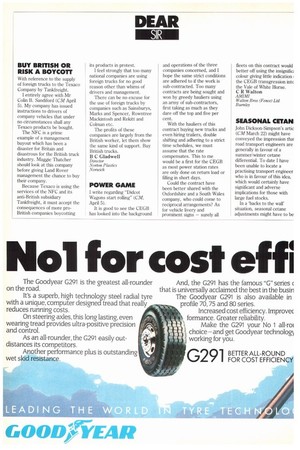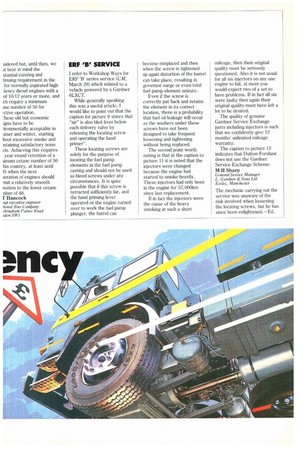BUY BRITISH OR RISK A BOYCOTT
Page 42

Page 43

If you've noticed an error in this article please click here to report it so we can fix it.
With reference to the supply of foreign trucks to the Texaco Company by Tankfreight.
I entirely agree with Mr Colin B. Sandiford (CM April 5). My company has issued instructions to drivers of company vehicles that under no circumstances shall any Texaco products be bought.
The NFC is a prime example of a management buyout which has been a disaster for Britain and disastrous for the British truck industry. Maggie Thatcher should look at this company before giving Land Rover management the chance to buy their company.
Because Texaco is using the services of the NFC and its anti-British subsidiary Tankfreight, it must accept the consequences of more proBritish companies boycotting its products in protest.
I feel strongly that too many national companies are using foreign trucks for no good reason other than whims of drivers and management.
There can be no excuse for the use of foreign trucks by companies such as Sainsburys, Marks and Spencer, Rowntree Mackintosh and Rekitt and Colman etc.
The profits of these companies are largely from the British worker, let them show the same kind of support. Buy British trucks.
B C Gladwell Director
Norton Plastics Norwich
POWER GAME
I write regarding "Didcot Wagons start rolling" (CM, April 5).
It is good to see the CEGB has looked into the background and operations of the three companies concerned, and I hope the same strict conditions are adhered to if the work is sub-contracted. Too many contracts are being sought and won by greedy hauliers using an army of sub-contractors, first taking as much as they dare off the top and five per cent.
With the hauliers of this contract buying new trucks and even hiring trailers, double shifting and adhering to a strict time schedules, we must assume that the rate compensates. This to me would be a first for the CEGB as most power station rates are only done on return load or filling in short days.
Could the contract have been better shared with the Oxfordshire and a South Wales company, who could come to reciprocal arrangements? As for vehicle livery and prominent signs — surely all fleets on this contract would better off using the insignifiG colour giving little indication the CEGB transgression intc the Vale of White Horse. C R Walton
AMIM1 Walton Bros (Fence) Ltd Burnley
SEASONAL CETANI
John Dickson-Simpson's attic (CM March 22) might have conveyed the impression thai road transport engineers are generally in favour of a summer/winter cetane differential. To date I have been unable to locate a practising transport engineer who is in favour of this idea, which would certainly have significant and adverse implications for those with large fuel stocks.
In a 'backs to the wall' situation, seasonal cetane adjustments might have to be
sidered but, until then, we -it bear in mind the
stantial existing and tinuing requirement in the for normally aspirated high iency diesel engines with a of 10/12 years or more, and ch require a minimum arie number of 50 for !ctive operation.
:hese old but economic igns have to be ironmentally acceptable in amer and winter, starting hout excessive smoke and Intaining satisfactory noise els. Achieving this requires year-round retention of a aimum cetane number of 50 his country, at least until )5 when the next
aeration of engines should -mit a relatively smooth nsition to the lower cetane
nber of 48.
r Hancock .
ERF 'EV SERVICE
I refer to Workshop Ways for ERF 'B' series service (CM. March 29) which related to a vehicle powered by a Gardner 6LXCT.
While generally speaking this was a useful article, I would like to point out that the caption for picture 9 states that "air" is also bled from below each delivery valve by releasing the locating screw and operating the hand primer".
These locating screws are solely for the purpose of locating the fuel pump elements in the fuel pump casting and should not be used as bleed screws under any circumstances. It is quite possible that if this screw is retracted sufficiently far, and the hand priming lever operated or the engine turned over to work the fuel pump plunger, the barrel can
become misplaced and then when the screw is tightened up again distortion of the barrel can take place, resulting in governor surge or even total fuel pump element seizure.
Even if the screw is correctly put back and retains the element in its correct location, there is a probability that fuel oil leakage will occur as the washers under these screws have not been designed to take frequent loosening and tightening without being replaced.
The second point worth noting is that in the caption to picture 11 it is noted that the injectors were changed because the engine had started to smoke heavily. These injectors had only been in the engine for 57,000km since last replacement.
If in fact the injectors were the cause of the heavy smoking at such a short mileage, then their original quality must be seriously questioned. Also it is not usual for all six injectors on any one engine to fail, at most you
would expect two of a set to have problems. If in fact all six were faulty then again their original quality must have left a lot to be desired.
The quality of genuine Gardner Service Exchange parts including injectors is such that we confidently give 12 months' unlimited mileage warranty.
The caption to picture 12 indicates that Dutton Forshaw does not use the Gardner Service Exchange Scheme.
M H Sharp General Service Manager L. Gardner & Sons Ltd Eccles, Manchester
The mechanic carrying out the service was unaware of the risk involved when loosening the locating screws, but he has since been enlightened. —Ed.
































































